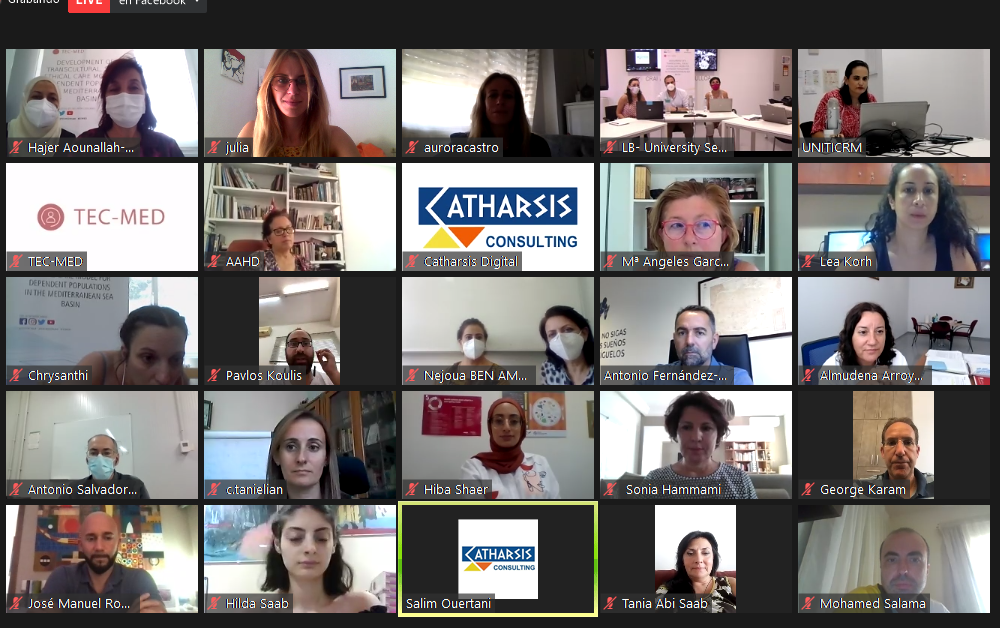TEC-MED project discusses plans to support dependent elderly people in Egypt, Greece, Lebanon, Spain, Tunisia

The event, held on July 16, brought together all the project partners and more than 50 stakeholders.
On July 16, the II International TEC-MED Workshop was held. This online event, the first of the four planned, was organized by the Tunisian partner and aimed at exchanging the status of the progress of the TEC-MED project with key stakeholders and presenting the capitalization plan to collect their ideas and opinions.
All project partners participated in this workshop and 57 stakeholders, including health professionals, representatives of government institutions, university professors, members of companies related to the health sector, or members of non-governmental organizations, among others.
Methodology
The workshop included 3 sessions. The first one consisted of a plenary session with all the project partners and stakeholders, where the project presentation was carried out. In addition, the joint action plan for the application of the TEC-MED model, the specific capacity development plan for each partner, and the capitalization plan were presented.
The second session consisted of 5 meetings in parallel, 1 per country (Egypt, Lebanon, Tunisia, Greece, and Spain), where a discussion was held on the different strategies to include, eliminate, or modify the capitalization plan presented. For this discussion, a SWOT analysis was developed on the plan to identify the important internal and external aspects, both positive and negative, that allow achieving the objective of maintaining the project over time.
Finally, the conclusions were presented, and the workshop closed.
Capitalization plan
This plan serves as a guide for activities that aim to implement the results of the project and will be used by project participants and partners. The objective is to ensure the long-term implementation of the TEC-MED model in the Mediterranean basin. The plan summarizes the commercialization aspects of the products resulting from the TEC-MED project and the social and business capitalization.
Conclusions
During the parallel sessions, information has been collected that will be used to update the plan and add the most interesting strategies to achieve the objective. First, the SWOT methodology was used to obtain the most relevant strengths, weaknesses, threats, and opportunities, and subsequently, some possible strategies to insert into the plan were defined.
From Spain, the strategies obtained were the following: tutoring for the complexity of the TEC-MED project, accompaniment of the elderly, foster digital technology for the elderly, Institutional involvement to change policy (at the international and national level) and break barriers with a new business model based on Social Capital.
On the part of Tunisia, they will establish synergy between the TEC-MED project and the national multisectoral strategy for the care of the elderly, coordinated by the Ministry of Women, the Family, and the Elderly (MFFPA).
In the case of Greece, they will go ahead with the communication / Reaching procedure with final beneficiaries as well as with technology and digital familiarization. In addition, they will train of involved new partners for the pilot implementation and will try to keep in touch with the Regional Administration of Western Greece
From the Lebanon side, the team of the TEC-MED thinks that it is an opportunity to improve access of older persons to technological solutions. Additionally, they will call the attention of the elderly through different channels and beyond location issues and vulnerabilities
Lebanon's team will improve communication and networking between different social partners and the creation of a database for services.
Finally, Egypt's team will do outreach activities to identify more stakeholders and they will arrange small group frequent meetings emphasizing multidisciplinary activities.
This list of strategies, obtained at the end of the workshop, and customized to the conditions of each country, will be studied to integrate them into the capitalization plan.









